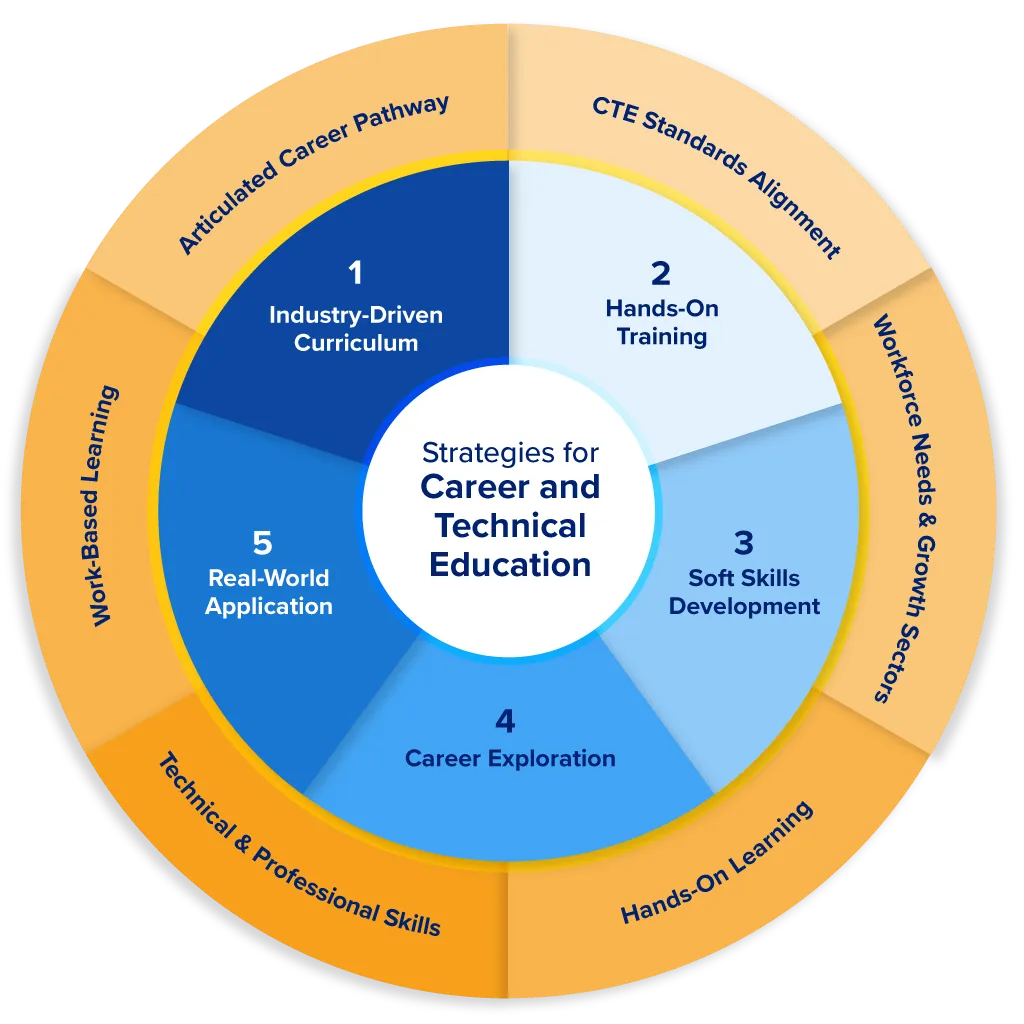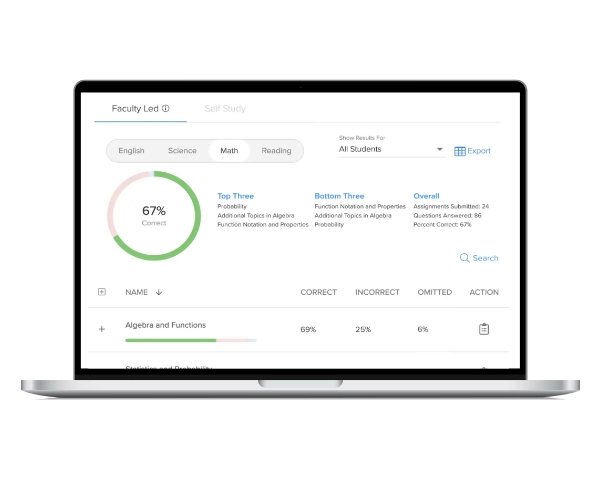The demand for high school courses that prepare students for the workforce has never been greater. AP classrooms are helping to fill that void, providing career and technical education (CTE) programs that integrate real-world skills with rigorous academic coursework.1
The College Board's® AP Career Kickstart Program
To bridge the gap between traditional academic courses and career preparation, the College Board® launched its AP Career Kickstart program.2 This initiative expands the successful AP model to include career-focused courses designed in collaboration with industry leaders, college faculty, and educators. These courses offer students the opportunity to earn college credit and industry-recognized credentials concurrently, giving them a competitive edge in the workforce.
Currently, the program includes 2 pilot courses: AP Cyber: Networking and AP Cyber: Security.3 These full-year courses align with career and technical education standards, emphasize hands-on learning, and prepare students for high-demand fields such as cybersecurity. Students with qualifying AP exam scores can receive vouchers to cover the cost of CompTIA certification exams, further enhancing their job readiness.
While this initiative is a step forward, not all districts can immediately implement these new AP Career Kickstart courses. However, AP educators can still integrate CTE's career-building strategies into their existing AP curriculum to support students' workforce readiness.
5 Strategies to Build CTE Workforce Skills in the AP Classroom
The College Board's AP Career Kickstart courses are designed to integrate career readiness into high school education by incorporating key workforce competencies. These courses are structured to:2
- Fit into an articulated career pathway
- Align with career and technical education standards
- Relate to workforce needs in high-growth sectors
- Offer applied, hands-on learning that builds problem-solving skills
- Include technical and professional skills
- Embed work-based learning opportunities
For AP courses to effectively integrate career-readiness strategies, they should incorporate these same principles. Educators can accomplish this by implementing 5 key strategies that mirror CTE best practices: industry-driven curriculum, hands-on training, soft skills development, career exploration, and real-world application.4 By doing so, AP courses can provide students with the dual benefit of rigorous academic preparation and practical career-oriented skills.

These strategies enhance student engagement and prepare them for various post-secondary options, whether that means entering the workforce, pursuing industry-recognized certifications, or continuing their education at a 2- or 4-year institution.
Strategy 1: Incorporate Industry-Driven Curriculum
CTE programs ensure that coursework aligns with industry standards by collaborating with business leaders and professionals. This helps students develop relevant skills that meet current job market demands.
Incorporating This Into Existing AP Courses: Partner with professionals in the field. For example, AP Environmental Science teachers could work with environmental engineers to develop case studies, while AP Computer Science teachers could engage with IT professionals to ensure students learn skills applicable to current technological advancements.
Providing students with opportunities to analyze industry reports, explore market trends, and participate in mentorship programs can further align coursework with workforce expectations. Encouraging guest lectures and industry-sponsored projects can help students bridge the gap between academic learning and professional practice.
Strategy 2: Integrate Hands-On Training
CTE emphasizes hands-on learning through internships, cooperative education experiences, and project-based activities that simulate real job scenarios.
Incorporating This Into Existing AP Courses: Design labs, simulations, and interactive assignments that mimic industry tasks. For example, AP Chemistry students can partner with laboratories to conduct experiments that reflect current scientific research. You can implement problem-based learning (PBL) strategies where students tackle complex challenges using their AP coursework. Collaborative projects that require students to prototype solutions for real-world issues, such as urban development in AP Human Geography or cybersecurity in AP Computer Science, can deepen practical understanding.
Strategy 3: Develop Soft Skills
Employability skills such as communication, teamwork, and critical thinking are key components of CTE programs.
Incorporating This Into Existing AP Courses: Incorporate structured group projects, peer assessments, and public speaking opportunities into your curriculum. AP Seminar and AP Research courses already emphasize these skills, but you can integrate debate-style discussions, collaborative presentations, and structured role-playing activities to enhance your students' ability to think critically and communicate effectively.
For instance, AP English Language students can engage in persuasive writing and formal debate exercises, while AP Psychology students can conduct peer-led case study discussions. Regular peer feedback cycles and self-reflection activities can further reinforce these skills.
Strategy 4): Introduce Career Exploration
CTE programs expose students to various career options, helping them make informed decisions about their futures.
Incorporating This Into Existing AP Courses: Incorporate job shadowing opportunities, industry interviews, and career-related writing assignments into your courses. AP Economics instructors, for example, can have students analyze career pathways in finance and entrepreneurship, while AP Physics teachers can highlight careers in engineering and technology.
Research assignments that require students to explore career trends, job outlooks, and industry requirements can deepen their understanding of potential career paths. Additionally, partnering with local businesses or hosting career panels featuring professionals from relevant fields can give students firsthand insight into career opportunities.
Strategy 5: Mirror Real-World Applications
Connecting coursework to practical, real-world experiences keeps students engaged and helps them understand the relevance of their education.
Incorporating This Into Existing AP Courses: Design assignments that mirror real-world challenges, such as policy analysis in AP U.S. Government or market trend forecasting in AP Macroeconomics. AP Statistics students can conduct data-driven studies on community issues, while AP Biology students can collaborate with health professionals to examine public health trends. You can further reinforce real-world applications by integrating service-learning projects, where students apply classroom knowledge to address local challenges.
Encouraging your students to participate in competitions, such as coding hackathons for AP Computer Science or mock trials for AP U.S. Government, can provide additional opportunities for hands-on learning.
Looking Toward the Future with CTE in AP
The integration of CTE strategies into AP coursework represents an evolving approach to education that emphasizes college and career readiness. As the College Board continues to expand its AP Career Kickstart program, the future of AP education will likely include more opportunities for students to gain hands-on, industry-aligned skills. By incorporating workforce-ready competencies into AP classes today, you can ensure that students are prepared for whatever path they choose — whether that means pursuing higher education, entering the workforce, or both.
References
- iCEV. (n.d.). Career & technical education (CTE). Retrieved January 29, 2025, from https://www.icevonline.com/blog/career-technical-education-cte
- College Board. (n.d.). Career Kickstart: AP and CTE [Webpage]. Retrieved January 29, 2025, from https://apcentral.collegeboard.org/about-ap/outreach-and-collaborations/career-kickstart
- College Board. (n.d.). Are there overviews of cybersecurity pathway courses? Retrieved January 29, 2025, from https://apcentral.collegeboard.org/help-center/are-there-overviews-cybersecurity-pathway-courses
- Partnership Grand Strand. (n.d.). Career and technical education (CTE): Empowering the workforce of tomorrow. Retrieved January 29, 2025, from https://www.partnershipgrandstrand.com/career-and-technical-education-cte-empowering-the-workforce-of-tomorrow/




